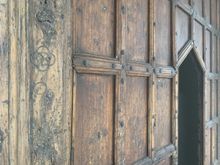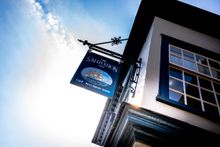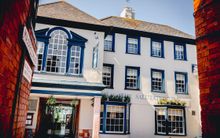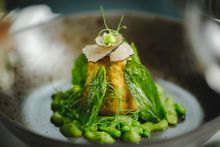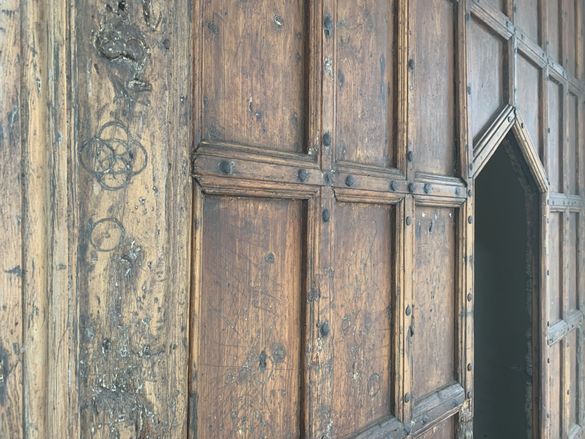 07 Aug 2019
07 Aug 2019
Tags: Hotel, historical hotel, Inn, Devon, interesting places to eat, Exeter, Coast

The Salutation Inn is one of Topsham's oldest residents, known best for its fine dining, bed and breakfast. But with age and maturity come fascinating stories from by-gone eras.
This historic coaching house has welcomed travellers crossing Devon by carriage and ship for over 300 years. Located in the heart of Topsham, the Inn's infamous and spectacular history is immortalised by centuries of books, newspapers and court documents. Full of tales of rambunctious balls, legends, sporting events, smuggling and romance, The Salutation Inn has long been at the centre of Devon life.
In a previous lifetime, the site included a skittle alley, bowling green, and stables for 'upwards of 30 horses.' In addition to providing the headquarters to many clubs and societies, the Inn hosted Masons, Oddfellows, rifle volunteers, sheep shearers and was renowned for its wrestling arena.
Some of its more colourful anecdotes include:
Ancient wicket door with witches' marks to ward off evil spirits
The main entrance is a solid wicket door dating back to 1720 – or earlier it is believed. According to English Heritage, it is the largest single leaf door in the country. Carved into the woodwork, you'll see clusters of carved circles. These are apotropaic marks, better known as witches' marks used as ritual protection symbols to ward off evil spirits.
Horse jumping in the dining room
The Exeter Gazette stated, 'The Aylesbury feat of jumping a horse over a table in a dining-room was attempted at The Salutation Inn, Topsham, by a party of sporting costermongers; but a catastrophe was presented by the timely interference of the landlord.'
The arrival of gin into Britain and curbing consumption
Formerly a thriving seaport, Topsham was a centre of fishing, shipbuilding and trading. In 1700s, wool and cotton were exported to Holland and in return, Dutch-bricks came back to create the Dutch architecture of Topsham. As the gatekeepers of trade, Topsham imported Dutch spirits which resulted in the Gin Craze as it swept across Britain.
A far cry from today's trendy tipple to enjoy in polite society, in the 1700s, gin replaced Britain's staple of beer, and became a spirit desperately consumed by the pint-full, by both men and women alike. Moral panic swept across the nation, as hordes of the population became addicted to gin. These dark days for Britain resulted in infamous stories arising, such as the poor exchanging their own clothes for the spirit, mass public nudity and burning babies.
At the frontline of shipping Dutch spirits into the country, gin destruction didn't escape The Salutation and it was said that, 'It was not a common thing for police to be called in consequence of disturbance in the house'. Turbulent tales in Western Times and E & P Gazette document 'disgraceful proceedings at The Salutation' as a result of 'a pint of gin' and 'large doses of opium'.
To curb gin consumption, The Sale of Spirits and Gin 'Tippling Act' enforced the licensing of its sale and taxed spirits for the first time.
Headquarters to stave off an impending French invasion
When England was expecting a Napoleon-led French invasion in 1794, the Salutation hosted the headquarters for Colonel Robert Hall's Devon and Cornwall fencibles. Their job was to patrol the coastline and protect citizens from an incursion during the emergency.
Topsham signs to abolish slavery
One of the earliest petitions against slavery was signed in The Salutation's Assembly Room. In 1792, the townspeople came together and almost unanimously agreed and signed a 'Petition to Parliament for the Abolition of the African Slave Trade.'
Home to Devon Wrestling
Grandstands were erected on The Salutation bowling green, so that thousands of people could attend rowdy wrestling matches. The contestants were David Beckhams of their time and threw their hat into the ring to challenge onlookers to a fight, while wagers were cast. Regional differences saw a clash in cultures: the Cornish adopted a 'hugging' stance and wrestled barefoot, whereas Devonians kicked clad in baked boots. Fights were serious and tough, lasting for hours.
Fireworks, flying men, balloon ascents, elephants and cows
As part of 1800s leisure, the public congregated at The Salutation's bowling green. From here, fetes and galas were held with generous entertainment to amuse townspeople and visitors. Military bands, dancing, balloon ascents, flying men, cows, elephants, racing and athletic sports were the spectacle of these events, all concluding with a grand firework display. A paper in 1873 says, 'The Salutation fireworks were well worth seeing, and the display was much superior to anything of the kind seen in Topsham for a long time.'
Modern day fine dining, bed and breakfast
Nowadays, The Salutation is run by the Williams-Hawkes family. Offering daily lunches, fine dining, bed and breakfast, it is now a foodie-bolthole as opposed to a drinkers pub.
The Salutation's history, curated by Ed Williams-Hawkes, is detailed in The History of The Salutation Inn (PDF) at www.salutationtopsham.co.uk/the-history.
[ends]
The Salutation Inn
68 Fore St, Topsham, Exeter EX3 0HL
www.salutationtopsham.co.uk | 01392 873060 | info@salutationtopsham.co.uk
Twitter - @Salutation1 | Instagram - @SalutationInn | Facebook - /SalutationTopsham
For interviews, references, images and further information, please contact Harry Wild at Go Wild Communications: harry@gowildcommunications.com | 07540399025 | www.gowildcommunications.com
IMAGES
Please find a general selection of images available to download here:
dropbox.com/sh/lblji7pwlycv8sp/AADMCxc9J2cvcJCSFNaz6OU7a?dl=0

